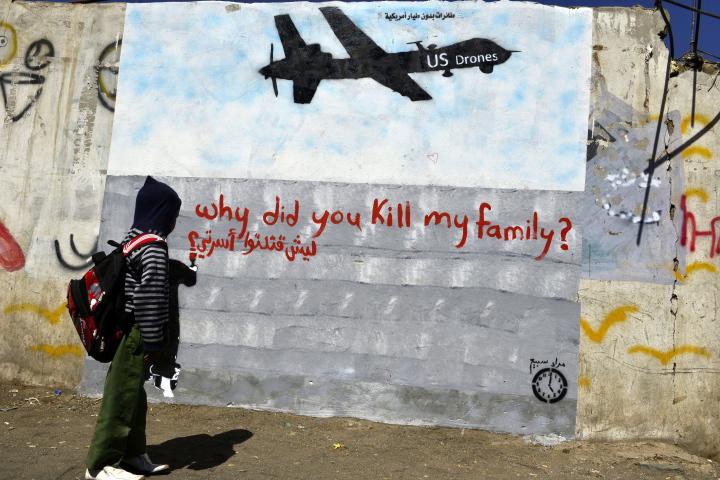Three Years of US-Saudi led War Has Brought Yemen to Brink of Humanitarian Catastrophe

As the ‘forgotten war’ in Yemen enters its fourth year, the cost of human suffering remains incalculable. The Saudi Arabia-led international coalition refuses to end its military blockade of Yemen. And United States (US) continues to feed arms to the Saudi Arabia and other allies in Yemen. Amid these political game plans in the West Asian region, Yemen is on the brink of a humanitarian catastrophe that is threatening to engulf whole of its population.
Just last week, President of the United States Donald Trump met with the the Crown-Prince and head of state Mohammed bin Salman to discuss the arms deals between the US and Saudi Arabia. Trump stated several times that he would help propel the proposed deal forward, which had been stalled in Congress, and that the deal would be great for the country as it would bring billions of dollars and investment as well as jobs.
The war began in 2015, when Shia majority Houthi rebels took over the country and removed the Saudi backed government of Abdrabbuh Mansur Hadi with the help of former President of Yemen Ali Abdullah Saleh. The Saudi-led coalition began a massive bombing campaign to push back the Houthi rebels. In the turn of events and further complicating the ongoing conflict, Saleh was recently killed by Houthis, after he switched sides to the Saudis.
Millions of people in Yemen are suffering from the military blockade by Saudi Arabia and the relentless bombing campaign led by the international coalition. The vital infrastructure in the country, including hospital, sanitation and hygiene, have crumbled due to the bombings. The situation has been exacerbated by the blockade which has led to the shortage of vital medical, food and fuel supplies.
In June 2017, the United Nations declared "world’s worst cholera outbreak” in Yemen. There have been more than 8,15,000 suspected cases of the disease and 2,156 deaths. About 4,000 suspected cases are being reported daily, more than half of which are children under 18. According to reports, the country’s drinking water supply will completely collapse by 2025 if the crisis looms.
Despite international outcry, schools and hospitals were specifically targeted by the Saudi forces. One such incident reported by Save the Children and Watchlist notes:
“The aerial bombing by the Saudi-led coalition of Abs Hospital in Hajjah governorate in August 2016, which the report says killed 19 people and injured 24. At the time of the attack, 23 patients were undergoing surgery, 25 children, including 13 newborns, were in the paediatric unit.”
Despite the catastrophic consequences, the western countries like the US, UK and France are providing logistics and support to the Saudi-led international coalition. United Arab Emirates Bahrain, Kuwait, Qatar (until 2017), Egypt, Jordan, Morocco, Senegal, Sudan from the region are backing up the campaign with ground support.
Bruce Riedel, a senior fellow at the Brookings Institution and a 30-year-old veteran of the CIA, explained that "if the United States and the United Kingdom, tonight, told King Salman [of Saudi Arabia], ‘This war has to end,’ it would end tomorrow. The Royal Saudi Air Force cannot operate without American and British support.”
After the recent meeting between Saudi Arabia’s Crown Prince Mohammed bin Salman and US President Donald Trump, the US State Department approved the sale of an estimated $670 million worth of arms to Saudis.
The US military's Central Command (CENTCOM), apart from providing mid-air refuelling capacity for the international coalition, is coordinating the airstrike missions in Yemen, that has killed thousands of innocent civilians.
Last year, the U.S. State Department has approved the sale of $1.3 billion worth of air-to-ground weapons to Saudi Arabia, to replenish the Royal Saudi Air Force’s (RSAF) current weapons supplies, which are becoming depleted due to the high operational requirements of the offensive in Yemen. The sale includes approximately 22,000 bombs.
According to Stop War Coalition, “Britain’s arms sales to Saudi Arabia increased by 11,000 percent in the three months following the start of its [coalition] bombing campaign against Yemen in March 2015. Close to £3.8 billion worth of UK arms have been sold to the Saudi regime since the beginning of the war.”
Also recently in 2017, an ITV news report, exposing the deep collaboration between the UK and international coalition, noted that that UK ‘liaison officers’ are deployed in the Saudi Arabian Air Operation Centre (AOC). The AOC coordinates the bombing raid in Yemen, which highlights the complicity of Britain in the killing of civilians in Yemen.
Meanwhile, on the eve of the three year anniversary of the Saudi-led military intervention in Yemen, Houthi rebels launched missiles into Saudi Arabia on Sunday, March 25. The missiles were mainly aimed at the airports of Riyadh.
So far only one casualty has been reported -- an Egyptian resident in Riyadh killed by the debris. He is the first casualty in the Saudi Arabian capital since the war began.
Houthi spokesperson Muhammad al-Bukhaiti stated that the attack was in "response to the bombing of Yemeni cities, and the siege of the Yemeni people." He reiterated the importance that the Saudis return to negotiations but warned that Houthi attacks would not cease until Saudi aggression ends, especially the destructive aerial bombardment.
Get the latest reports & analysis with people's perspective on Protests, movements & deep analytical videos, discussions of the current affairs in your Telegram app. Subscribe to NewsClick's Telegram channel & get Real-Time updates on stories, as they get published on our website.























